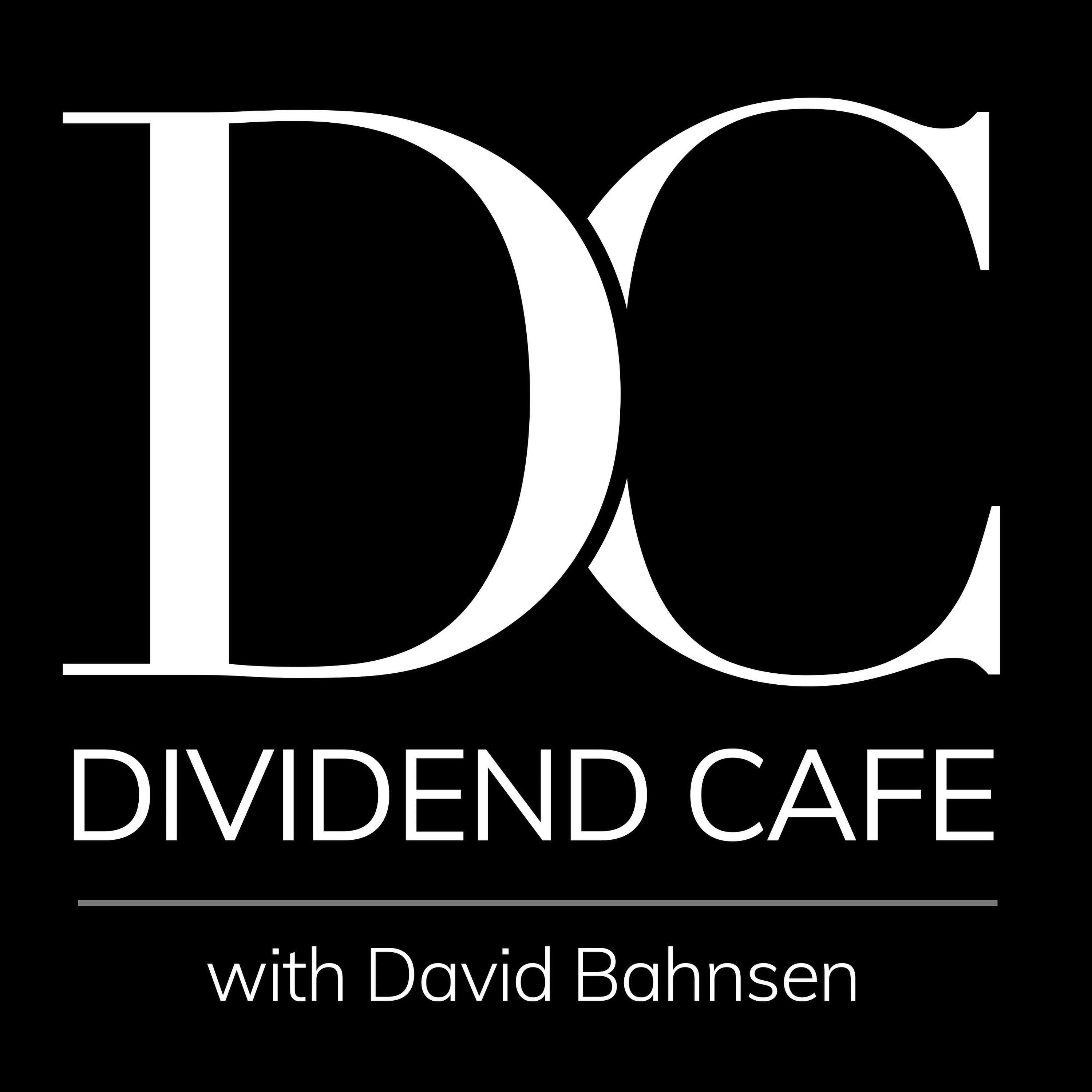Dear Valued Clients and Friends,
Some day-to-day volatility in the market unsurprisingly surfaced in markets this week as we were down 100, down 300, then up 200 the first three days of the week, all around various chitter-chatter as to where China-trade talks were or were expected to be or were rumored to go or whatever … This is a frustrating Dividend Cafe to send because I have no choice in terms of the timeline but to submit it before we have gotten real reports on how the trade talks have gone Thursday, and yet you will be receiving this Friday and of course by now there may very well be some updated report as to how the status of such talks. Of course, by early next week, I will provide an interim Dividend Cafe to give an update on the state of affairs …
The trade talks are the largest macro issue to watch right now, as once again the futures market has all but fully priced in another Fed quarter-point rate cut (at the October FOMC meeting at the end of the month). But markets are likely to respond to earnings results as the new season kicks off this coming week. Expectations are again reduced so how companies report revenue and profit results from the quarter that just was, and what sort of guidance they offer about expected results in the quarters ahead, are very likely to move the needle (in the overall market level, and of course in individual company results).
This week’s Dividend Cafe is really focused on the economy, the Fed, politics, and earnings. We look at a preview of earnings season, the idea of a QE4 coming, a deeper dive on economic indicators, and of course, Politics and Money. Grab your coffee, and jump on into the Dividend Cafe …
Dividend Café – Podcast
Dividend Café – Vidcast
Earnings Preview
We will see the initial batch of earnings results next week and then an avalanche of Q3 results come in the few weeks thereafter. Q1 and Q2 were expected to create a year-over-year decline, and in both cases there ended up being a small increase … The consensus view is once again for a Q3 decline year-over-year, and this time by 2.7%. Ultimately I expect it will fall on the Tech sector to either outperform expectations (and carry overall market earnings growth into positive territory, or not).
I have tried to provide paradigms to understand the broad market in the chart below:
- The blue circle the huge earnings growth we got last year (priced in the huge year of 2017)
- The more muted year squared in black below that we are living in and that markets have well understood all year
- And then, the real issues going forward (circled in red) – and that is the rather robust earnings growth that markets are expecting into 2020.
The blue is past, the black is present, but the future comes down to the red.

* Strategas Research, Investment Strategy Report, Oct. 7, 2019, p. 1
In the earnings weeds …
We have noticed that a lot of health care companies have revised their earnings expectations upward, but there have been a fair amount of downward revisions in Financials, Telecom, and Industrials. Our investment committee did a full podcast dedicated to this subject this week in terms of what to expect, how it could impact markets, and what it means to you. We are particularly interested in how companies report on the impact of the trade war on their Q3 results and Q4/2020 projections.
Waiting on pins and needles
It is killing me to have to go to press without an update on the Trade talks, but what we know at this point is that a narrow deal – some modest progress in a few categories of the dispute – is the best-case scenario for this weekend’s talks. An additional tariff increase on $250 billion of imports is scheduled for next week, and both sides are hoping to make enough progress to allow that increase to be avoided. A lot of conversation has surfaced this week about a currency deal being part of a potential band-aid, with Technology and Security sure to dominate other silos of the discussion.
What we expect/hope to see is:
(a) A cessation of escalations (when you are in a ditch, stop digging)
(b) A purchase agreement from China of U.S. agriculture and energy products
(c) Some delays and even cancellations of U.S.-imposed tariffs
(d) A currency agreement that caps CNY depreciation
Hope is not a strategy. We’ll know more at any moment!
Did someone say QE4?
Actually, Chairman Powell, this week did bring up QE (the idea of a fourth round of quantitative easing), but he brought it up to deny that they were doing it. He explained that, yes, they were resuming “bond buying,” but that it was not QE because it would not be a rapid expansion of the balance sheet, but rather the ceasing of their shrinking excess bank reserves, which enables the Fed balance sheet to grow in concert with the demand for more liquidity. This would be a more normal increase of the balance sheet (pre-2008), though it will be taking place with a nearly $4 trillion balance sheet (vs. pre-2008 where the Fed was sitting on ~$600 billion).
The driver here is the instability in the repo market over the last few weeks, and the need for improved liquidity at around higher-than-normal demand for cash. It is an “overnight funding” issue and not an attempt to control interest rates.
There is no question many investors are hoping the Fed will go to a sort of QE4, having been spoiled by Fed interventions that boost the prices of risk assets. I am not saying that such an insanely aggressive policy tool will not end up being used by the Fed, and certainly, I believe they will go there next time we have a recession. But I do agree that what the Fed is doing now, complicated as it may be, is not Quantitative Easing, but rather monetary actions responsive to liquidity conditions in short term cash markets.

* Gavekal Research, Back to Balance Sheet Expansion, Oct. 9, 2019
Economic concern of the week
The theme of recent months about creeping negativity in business confidence, business investment, and manufacturing deserve all the content, data, analysis, and objective evaluation it can get. It is a big story – it may be the big story – both in terms of how 2020 political matters trend, but more importantly in the status of economic expansion. I am using Dividend Cafe week by week by week to present data in all shapes and sizes on this front, regardless of what direction the data leans. In recent months, CEO confidence (big, big companies) has turned south in concert with trade war uncertainty, but small business optimism had remained impressive. The most recent reading, though, does point to a turn in small business optimism to the downside. The total reading on an absolute basis remains in a good place, but its trajectory has moved down and that provides confirming data around other reversals of business confidence.

* NFIB, Small Business Optimism Index, October 7, 2019
So is all hope lost?
No. I believe the reversal of business confidence and business investment is related to uncertainty around the trade war, not certainty around bad stuff. Should there be some resolution to the trade war that allows for business confidence resumption, I could easily see business conditions improving (after a lag effect). The questions are: (1) Is such a trade deal coming? (2) If and when it does, will it be too late?
And one more thing …
If you are in the mood for a potential “glass half full” story, while we talked last week about the big drop in ISM Manufacturing (sentiment), the IHS-Markit Manufacturing Index pointed to a slight increase in activity … Now, it is a fair thought that sentiment is a leading indicator and activity a lagging indicator, but the point is that there is some conflicting data in the wind.
I remain concerned about business investment, as much for the lost opportunity as for the potential negative outcome, yet still extremely aware that a 3.5% unemployment rate is hard to correlate with a struggling economy.
A painfully obvious lesson in a time where people need it
I am not sure there are two topics on planet earth that cannot be boiled down to one of these two things when it comes to what is on investor minds these days: (a) Safety from the various concerns out there, (b) The need for income
Low yields have put a worldwide reach for cash flow into DEFCON1, and various uncertainties, market valuations, political dynamics, and central bank machinations have intensified the already-normal desire for investor stability.
So with those two things being front and center in people’s minds, it strikes me as profoundly obvious that dividend growth equity investing provides a leg up in both categories. Devoid of volatility? Of course not. But less exposed to intense market distress? You bet. Higher-income than the S&P, the Treasury market, etc.? Certainly. And a growth of that income to boot? Yep.
We do not believe there is a season when dividend growth is unattractive, but based on the two abundant objectives of most investors in this period we will likely be on for a long time to come, we would gently suggest that sometimes people have solutions more readily available than they think.
Contrarian blessing of the week
Sigh … Just when I am ready to get a tad bearish on stocks and intensify my defensiveness, I see this. A more contrarian bullish sign you will be hard to find.

* Sentiment Trader, Conference Board, Mauldin Economics, p. 4
Politics & Money: Beltway Bulls and Bears
- The House is on recess through the 14th and the “impeachment inquiry” did not have many specific developments this week, other than the White House making clear they were not going to play along until the Democrats actually hold a vote to launch the inquiry. The market seems rather committed to the idea that the House Democrats will end up impeaching when all is said and done and that the Senate will not convict when all is said and done. Assuming no new information enters the fray, that seems a pretty smart consensus view. The polls are not strong for the President around this, and many are watching and waiting to see how it will all play out.
- I did discuss the prospects of an Elizabeth Warren Presidency with Stuart Varney on Fox Business this week … I will be continuing to address these issues as they impact investors in the weeks and months to come, particularly as she continues to rise in the Democratic Primary polls. I can not say enough – how the contested Senate races play out in 2020 will be vitally important in how the markets react to the 2020 Presidential race.
- Betting markets now have Elizabeth Warren’s chances of winning the Presidency as 3x higher than Democratic rival, Joe Biden
Chart of the Week
The chart is focused on global GDP, not merely domestic, but we have consistently provided that domestic data (and how the impact of tax reform has been increasingly reduced by the offsetting impact of the trade war). However, from a global standpoint, the deterioration of GDP is even worse. The direct impact is significant (actual measurable loss of activity), but the secondary effects are where I believe greater political risk lies, not to mention economic risk.

* International Monetary Fund, World Economic Outlook, October 2019
Quote of the Week
“If you haven’t read hundreds of books, you are functionally illiterate, and you will be incompetent, because your personal experiences alone aren’t broad enough to sustain you.”
~ Gen. Jim Mattis
* * *
I will leave it there for the week. I am committed to a comprehensive trade update early next week by podcast and writing! In the meantime, we shall see what comes of the discussions, and perhaps just as important, how USC handles the Notre Dame Fighting Irish. Have a wonderful weekend, and cherish every moment.
With regards,

David L. Bahnsen
Chief Investment Officer, Managing Partner

The Bahnsen Group
www.thebahnsengroup.com
This week’s Dividend Café features research from S&P, Baird, Barclays, Goldman Sachs, and the IRN research platform of FactSet












